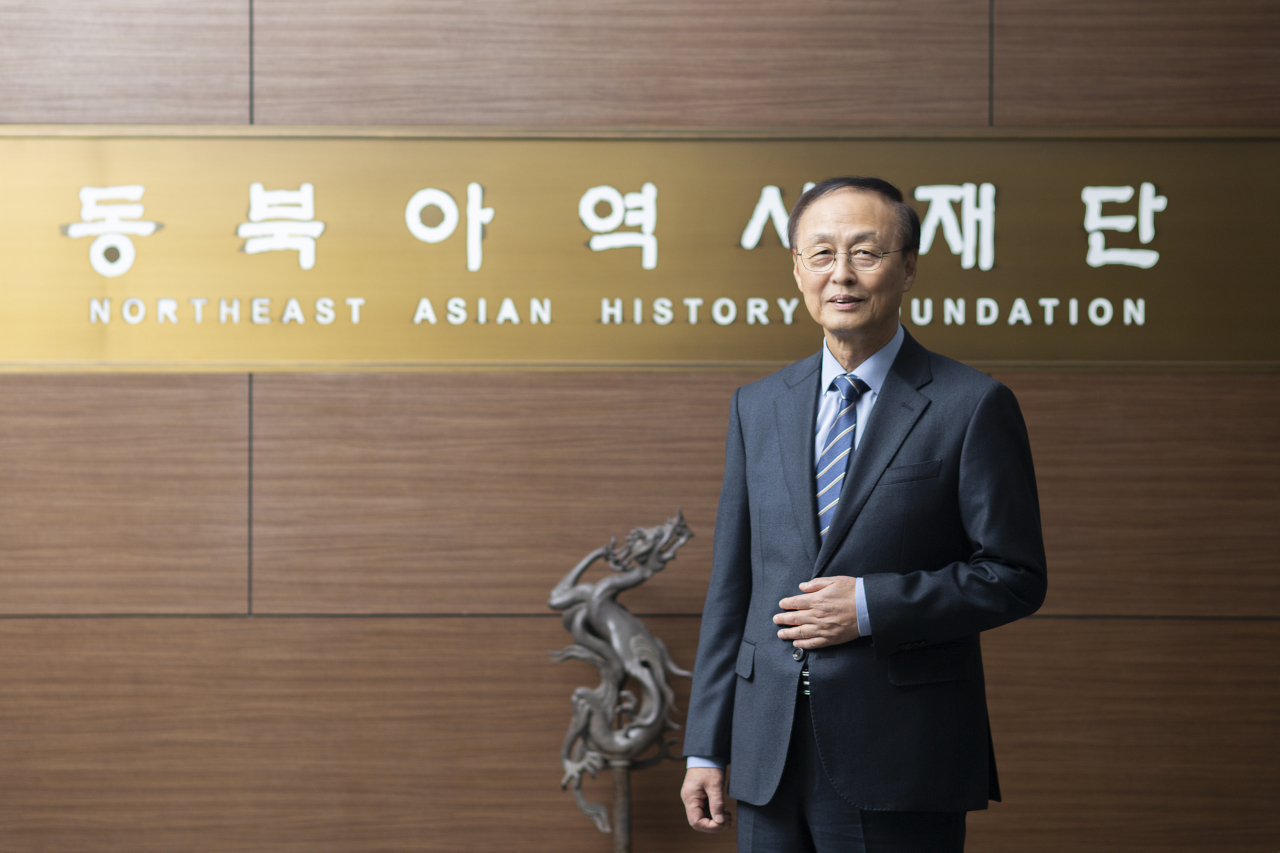[Korea Beyond Korea] ‘Korea should support Korean history studies, research abroad’
As disputes with China, Japan on historical issues worsen, NAHF chief seeks to expand cooperation with rest of world
By Kim So-hyunPublished : Sept. 25, 2023 - 14:55

Ever since its inception in 2006, South Korea’s state-funded Northeast Asian History Foundation has conducted research and analysis on issues involving Northeast Asian history and the Korean Dokdo islets to develop policies aimed at promoting peace and prosperity in the region.
“The foundation has held countless academic seminars with Japan and China, and made constant efforts for reconciliation, but the neighboring countries’ differences on historical issues have only gotten worse,” NAHF President Lee Young-ho said in an interview with The Korea Herald at his office in Seodaemun-gu, Seoul.
“We are therefore seeking to expand academic cooperation with the rest of the world.”
Japan’s post-war generation is growing tired of demands from Korean victims of Japan's colonial-era war crimes, and Chinese scholars cannot speak freely due to their government’s stance on historical issues, according to Lee, a historian who specializes in the late Joseon and colonial periods.
While the NAHF should continue to publish books in Chinese and Japanese as well as Korean, and communicate with scholars in the neighboring countries, it should also closely work together with the academic communities of the English-speaking world, he said.
Joint research or joint publications between Korean and English-using scholars have been slow so far as they differ greatly in methodology, approaches and how they build theses.
Korean academic papers, especially those by historians, tend to be heavily empirical; they introduce various materials and data, and the conclusion is often hypothetical or a mix of what might be possible, whereas in the US, it appears that the conclusion has to be very clear, according to the former professor of history at Inha University.
Nevertheless, closer cooperation with Western scholars has become ever more crucial as China, which acted as a suzerain for centuries, is increasingly stressing the historical subjugation of surrounding groups or countries, according to Lee.
“In the past, each province or ethnic group in China was given autonomy on textbooks, so the textbooks used by ethnic Koreans in China were in Hangeul, and included historical accounts of battles between Goguryeo and China’s Sui Dynasty (581-618). But since 2017, China nationalized its textbooks for all of its 55 ethnic minorities,” he said, referring to the shift in China’s policy for ethnic minorities from regional autonomy to assimilationism.
“Not only have they eliminated ancient Korean history such as that of Goguryeo (37 B.C.-A.D. 668) from their world history books, but they have been emphasizing the subjugation of surrounding kingdoms or groups even through the medieval times.”
To counter China’s suzerainty claims, it also helps to continue academic exchanges with Vietnam and Mongolia, which, like Korea, have resisted Chinese invasion attempts for centuries, Lee said.
The NAHF has held workshops for history teachers from Mongolia for over 10 years, where historians from both Korea and Mongolia participated, and study materials from the workshops have been translated into Mongolian.
An introduction to Korean history is currently being translated into Mongolian to be used there.
The foundation also plans to translate another book on Korean history into Vietnamese, has held academic conferences with Vietnamese scholars, and agreed to jointly publish books in English.
“Like how we call the sea between Korea and Japan the ‘East Sea’ (also known as the “Sea of Japan”), the Vietnamese use the term ‘East Sea’ for what is known as the South China Sea,” Lee said.
The foundation also publishes English-language academic journals such as the Journal of Territorial Maritime Studies (jointly with Yonsei University) and the Journal of Northeast Asian History, and plans to publish English versions of books for both academic and general readers on topics such as the history of Korea’s diplomacy and the history of colonial Japan’s governing of Korea.
“Korean Studies Beyond Korea” explores the current landscape of Korean studies through interviews, in-depth analyses and on-the-ground stories told from diverse world areas. Funded by the Korea Press Foundation, this series delves into the challenges and opportunities facing the field as Korea's rise as a cultural powerhouse has drawn interest from scholars, researchers and leaders from around the globe. – Ed.





![[KH Explains] No more 'Michael' at Kakao Games](http://res.heraldm.com/phpwas/restmb_idxmake.php?idx=644&simg=/content/image/2024/04/28/20240428050183_0.jpg&u=20240428180321)



![[Grace Kao] Hybe vs. Ador: Inspiration, imitation and plagiarism](http://res.heraldm.com/phpwas/restmb_idxmake.php?idx=644&simg=/content/image/2024/04/28/20240428050220_0.jpg&u=)









![[Herald Interview] Xdinary Heroes shoot for the next level with 'Troubleshooting'](http://res.heraldm.com/phpwas/restmb_idxmake.php?idx=642&simg=/content/image/2024/04/29/20240429050745_0.jpg&u=)